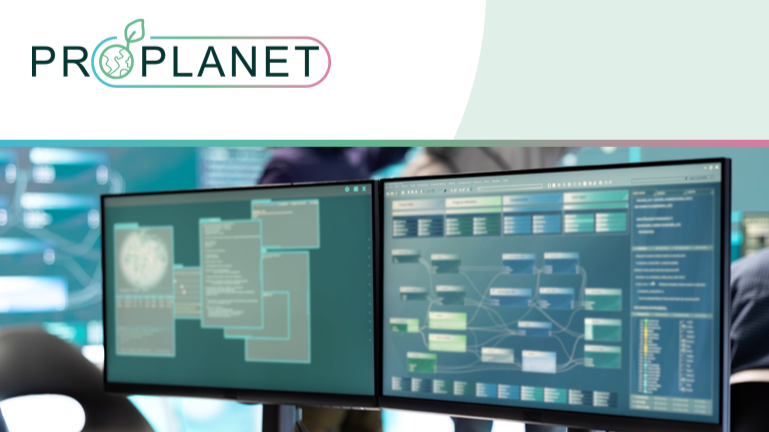
Publications
Discover the publications from the ECOSYSTEX community and its members.
Videos are available on ECOSYSTEX’s YouTube channel.
Filter by projects
- AEQUALIS4TCLF 2
- All 70
- CALIMERO 3
- CEMTex 1
- CISUTAC 6
- Colour4CRAFTS 1
- ECOSYSTEX 3
- EFFECTIVE 4
- HEREWEAR 3
- Hemp4circularity 1
- IMASUS 1
- IRISS 4
- LIFE TREATS 1
- My-Fi 2
- New Cotton 5
- PESCO-UP 1
- PROPLANET 8
- RegioGreenTex 17
- SCIRT 8
- SOLSTICE 5
- SUSTRACK 9
- T-Rex 7
- TRUSTEX 1
- VERDEinMED 1
- VETRINE 2
- Waste2BioComp 1
- tExtended 1
PROPLANET’s Replication Tool
The PROPLANET Replication Tool is an open‑source web application designed to help users explore PFAS‑free coating technologies for glass, metal, and textiles, offering an accessible way to compare formulation components, assess performance, and evaluate environmental and safety profiles.
Green VETRINE free online course
Green VETRINE has been developed by leading European training organisations in the textile and clothing sector, and delivers a European certificate for successful completion. The course is also available in seven languages.
Colour4CRAFTS digital exhibition and virtual tour – “Seasons of Colours” (2024)
Output related to milestone (M14), public exhibitions, for EU funded project, Colour4CRAFTS (no. 101094809). The digital exhibition and virtual tour consist of content and objects displayed at the physical “Seasons of Colours” exhibition held from 10 June to 18 August 2024 at the Arktikum in Rovaniemi, Finland. The exhibition had over 6000 visitors. The digital exhibition and virtual tour can be viewed via the link provided.
PROPLANET Deliverable D.6.5: End-of-Life strategies and activities for enhanced safe and sustainable coatings
Deliverable D.6.5 of the PROPLANET project presents tailored End-of-Life (EoL) strategies for each innovative coating, aligning their life cycles with circular economy principles. It addresses coatings, PFAS-related risks, circular economy concepts, and eco-friendly management approaches to promote sustainable industrial practices in line with EU objectives.
PROPLANET Deliverable D.6.2: LCA, sLCA, and LCC Assessments in enhanced safe and sustainable coatings for supporting the planet
Deliverable D6.2 of the PROPLANET project establishes revised methodologies for Life Cycle Assessment (LCA), Social Life Cycle Assessment (sLCA), and Life Cycle Costing (LCC), integrating the latest scientific and European advancements.
IRISS’s Update 1: Analysis of lifecycle steps, the value chains, their stakeholders and initiatives
This updated document analyses lifecycle steps, value chains, stakeholders, and initiatives, with a focused examination of the smart textiles sub-value chain within the broader textiles industry. It explores challenges and opportunities in advancing safe-and-sustainable-by-design (SSbD) practices for smart textiles.
IRISS’s Analysis of the value chains, their stakeholders and initiatives
This document provides an analysis of value chains, their stakeholders, and initiatives to support the EU’s transition to a climate-neutral and circular economy through safe-and-sustainable-by-design (SSbD) materials and products. As part of the IRISS project, it highlights challenges and opportunities in industries like textiles.
IRISS’s Skills, knowledge and education needs and gaps and mismatches for the uptake of SSbD
This document explores the skills, knowledge, and education gaps hindering the adoption of safe-and-sustainable-by-design (SSbD) principles across various value chains, including textiles. It aims to map training and knowledge needs, identifying mismatches and opportunities to enhance SSbD capacity building for industry stakeholders.
IRISS’s Design for circular economy
This report provides a comprehensive bibliographical study on circular economy and ecodesign, analysing the 9S strategy across various sectors with examples of its application to specific products and value chains, including the textile value chain.
PROPLANET Deliverable D6.6 [M12]: Health and safety conditions for enhanced safe and sustainable coatings supporting the planet
Deliverable D6.6 Health & safety conditions of PROPLANET addresses considerations related to the human health and safety of the coatings developed within the project. It is connected to task T6.5 Health and Safety Issues, which aims at avoiding exploitation problems of the products in terms of their safety, also in view of the standard regulations.
PROPLANET’s intial integration into standardisation process and roadmap for full standardisation
PROPLANET aims to standardise its activities through this roadmap, developed by RUKA with expert support from NILU and input to CEN and OECD.
PROPLANET Deliverable D7.14: Report on replicability cases of enhanced safe and sustainable coatings for supporting the planet
This PROPLANET report outlines the progress of Task 7.5 – Replication Cases (IDE), focusing on developments achieved during the first 12 months of the project. It begins with a detailed overview of the research lines pursued within the PROPLANET initiative. The report then describes the development of the PROPLANET Replication Tool and how end-users will interact with it. Additionally, it presents an initial selection of replication cases to be explored further by Month 36 (Deliverable D7.15). Each selected case includes a comprehensive review of the current state-of-the-art, along with an analysis of the main global production hubs relevant to each specific technology.
PROPLANET’s KPIs Report
This deliverable describes the work carried out under Task 1.3 “KPI’s definition and validation” to define and describe the Key Performance Indicators (KPIs) applicable in the PROPLANET project to enable efficient and effective monitoring of innovations. It provides a description of the technical, safety, environmental, economic and social KPIs that were defined based on the specific and strategic objectives of the project. It also describes the methodology and the target value/goal for the KPIs.
PROPLANET Deliverable D.7.2: Exhaustive market analysis towards circular approaches for enhanced safe and sustainable coatings supporting the planet
This Deliverable is linked to Task 7.1. “Market Analysis and Circular Business Planning” running throughout the PROPLANET project, under the work package related to the “Exploitation, Dissemination, Communication and Social Engagement”. Under this deliverable a comprehensive market analysis was conducted to gain insights into the primary market landscape, examine specific sectors, and analyse competitors, and assess the project's strengths and weaknesses.
EFFECTIVE's summary of LCA, LCC and s-LCA
The report describes the findings of Life Cycle Assessment (LCA), which was integrated by Cost (LCC) and Social investigation (S-LCA). The assessment focused on 6 new biobased large consumer products, namely carpet tiles for construction made of bio-based Nylon 6, bike pants made of bio-based Nylon 6, swimsuit made of bio-based Nylon 6, carpet tiles for construction made of bio-based Nylon 6.9, film for food packaging application made of bio-based Nylon 6.9, and film for non-food packaging application made of bio-based Polyester.
EFFECTIVE's analysis of relevant standards
The deliverable includes an overview of the main standards applicable to EFFECTIVE’s bio-based materials and products, with a specific focus on the textile value chain. It addresses the main characteristics of each standard, its applicability potential to the project, and identifies gaps that can be covered by future standardization activities.
EFFECTIVE's report on the additional markets for the developed bio-based materials
The report describes the replicability studies and trials performed in the project to pave the way for the future applications of the developed biobased monomers, polymers, and biomaterials into market sectors different from the ones primarily targeted by the project.
EFFECTIVE's results obtained out of surveys and interviews on the biobased products
The Deliverable assesses potential social acceptance issues toward the future market uptake of the biobased product prototypes developed within the project.







![PROPLANET Deliverable D6.6 [M12]: Health and safety conditions for enhanced safe and sustainable coatings supporting the planet](https://images.squarespace-cdn.com/content/v1/666b018c0edddc61de8d4e7c/1750168592363-6832A9N2OK5JSVGXH006/Deliverable6.6.png)




